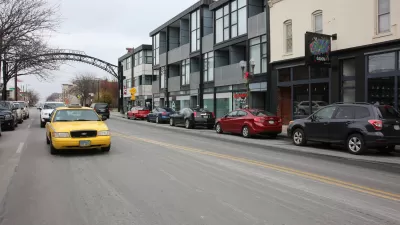Some think President Obama legislates from the "big government" end of the political spectrum, but when it comes to land use, at least, he's getting advice that local real estate markets should be liberated from too much regulation.
The suspected culprit in an economic mystery, according to an article by Nick Timiraos, is land use regulation. The mystery, sought after by White House economists, is why the U.S. economy remains sluggish on several key measures, especially productivity and the income levels of the middle class.
According to the article, Jason Furman, chairman of the White House Council of Economic Advisers, recently focused on the supply side of the housing market in a speech Friday [pdf] at a housing conference co-hosted byCoreLogic, a data company, and the Urban Institute, a think tank. Timiraos sums up the supply-side argument up for consideration, which should be familiar to Planetizen readers: "Some cities face supply constraints beyond their control. Coastal cities often see much pricier housing—and considerable price volatility—because there aren’t too many places left to build."
Furman referenced two studies in his speech, which Timiraos also cites as the evidence of the increased scientific attention to the effects of land-use regulations on the broader economy. "The first, by Federal Reserve economist Raven Molloy, shows how an increase in labor demand in cities with greater land-use restrictions results in less new housing construction, higher home prices, and lower long-run employment."
"The second paper, by Peter Ganong and Daniel Shoag of Harvard University, examines the slowdown in income convergence—that is, the rate at which incomes in places with lower incomes catch up with those in places with higher incomes. The paper found that income convergence was more common in states during the 1960s and 1970s regardless of constraints on housing supply. By the 1990s, states with more constrained housing supplies saw far less income convergence than those with less constrained housing supplies."
In effect, one of the article's main points is that despite the federal government's limited powers to control local land use regulations, a growing body of evidence suggests that the impacts of local laws are having enough effect in the national economy to attract the president's attention.
FULL STORY: Why White House Economists Worry About Land-Use Regulations

Alabama: Trump Terminates Settlements for Black Communities Harmed By Raw Sewage
Trump deemed the landmark civil rights agreement “illegal DEI and environmental justice policy.”

Study: Maui’s Plan to Convert Vacation Rentals to Long-Term Housing Could Cause Nearly $1 Billion Economic Loss
The plan would reduce visitor accommodation by 25% resulting in 1,900 jobs lost.

Planetizen Federal Action Tracker
A weekly monitor of how Trump’s orders and actions are impacting planners and planning in America.

Wind Energy on the Rise Despite Federal Policy Reversal
The Trump administration is revoking federal support for renewable energy, but demand for new projects continues unabated.

Passengers Flock to Caltrain After Electrification
The new electric trains are running faster and more reliably, leading to strong ridership growth on the Bay Area rail system.

Texas Churches Rally Behind ‘Yes in God’s Back Yard’ Legislation
Religious leaders want the state to reduce zoning regulations to streamline leasing church-owned land to housing developers.
Urban Design for Planners 1: Software Tools
This six-course series explores essential urban design concepts using open source software and equips planners with the tools they need to participate fully in the urban design process.
Planning for Universal Design
Learn the tools for implementing Universal Design in planning regulations.
Caltrans
Smith Gee Studio
Institute for Housing and Urban Development Studies (IHS)
City of Grandview
Harvard GSD Executive Education
Toledo-Lucas County Plan Commissions
Salt Lake City
NYU Wagner Graduate School of Public Service





























